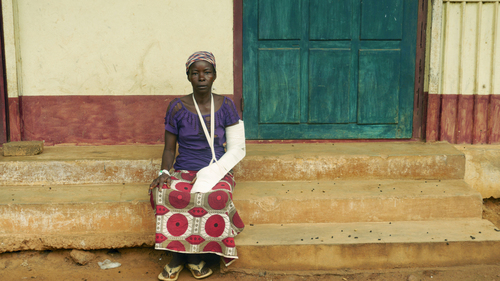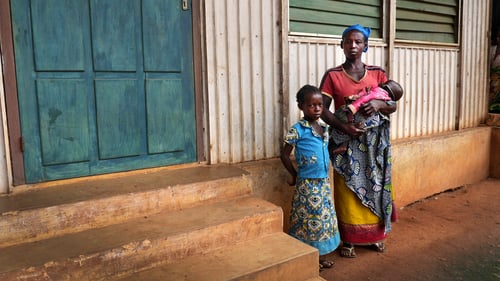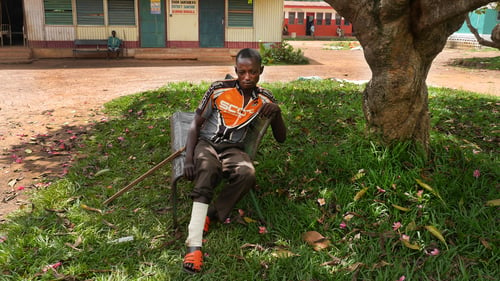Conflict has erupted in recent weeks in several cities in the Central African Republic (CAR). In Alindao, in the centre of the country, more than a hundred people have been killed and thousands have been displaced. Médecins Sans Frontières (MSF) has been supporting the hospital and the local health centre in the city for two weeks, and also conducting a vaccination campaign that will reach more than 7,000 children.
The situation in Alindao remains very tense. Last weekend, self-defence groups tried to attack the city again – first taking its airstrip and then breaking into the Catholic mission where more than 15,000 people were taking shelter. Members of the self-defence groups also confronted members of MINUSCA, the United Nations peacekeeping operation mandated to protect civilians and support transition processes in the CAR. In recent days, there have been clashes in villages on the outskirts of Alindao, only 20 kilometres away.
Conflict Comes to Alindao
Alindao had been praised as an exemplary city, with Banda and Yakoma Christians and Peuhl and Rounga Muslims – people of different ethnicities, religions and languages – living in a quiet community of around 20,000 people. Their relations did not change when the Séléka coalition (composed of armed groups from the north of the country, mostly Muslim) took control of the country in 2013. But on 8 May, fighting erupted between self-defence Christian groups and the Muslim military groups who were in control of the city. Like Bria, Bambari or Bangassou, Alindao is one of many cities which, in recent weeks, have faced a repetition of the bloody conflict that ravaged the country in 2013 and 2014 – resulting in killings, executions, and over one hundred thousand people fleeing their homes in the central and eastern part of the country.
Recent conflict and violence in Alindao were triggered by a minor incident involving the arrest of two young men by Muslim combatants. The situation escalated, resulting in the slaughter of at least 133 civilians, entire neighbourhoods being set alight, and the majority of the population – fifteen thousand people – fleeing to take refuge in the city’s Catholic mission.
They shot me in the shoulder and I fell down. I played dead; that's how I survived.Elisée R., 27
“The two boys were accused of being in the self-defence groups,” says Elisée R., 27. “Then, to apply pressure and demand their release, the self-defence groups kidnapped the family of one of the Séléka*. Shootings then began. The next day, the situation worsened when they started with the civilian population. They told the women to leave their homes, and that they had nothing against them. Then they burned the houses. When I saw that they were starting to burn mine, I had to leave. They shot me in the shoulder and I fell down. I played dead; that's how I survived.”
Paul A. – who does not know his age but told MSF he is more than sixty years old – fainted after being shot in the arm and in the cheek. “We don’t know how many people died,” he says. “They threw a lot of bodies into wells.”
An uncertain future
The displaced people sheltering in the Catholic mission do not know when they will be able to return to their neighbourhoods. “There’s still a lot of fear and it’s possible that the self-defence groups will want revenge. We won’t go back until there is peace in Alindao,” says Elisée R. The mission is protected by MINUSCA, the United Nations peacekeeping operation. During the day, women can go to the camps and pick up food and firewood to sell. Men do not dare leave the camp, for fear of being attacked.
While there is now an uneasy calm in Alindao, violence has continued in other towns nearby. The town of Seigneur, approximately 40 kilometres away, was attacked on 23 May. “All the houses were burnt,” says Germaine Y., 35. “Only the Catholic mission, the mosque and four houses remain standing.” Germaine’s eldest daughter, aged 17, was shot while fleeing. Germaine fears she is dead. Her second son, aged six, was shot in the leg.
Irene is the mother of a seven-year-old girl who was wounded when they fled and has a bullet lodged in her side, close to her chest. Her mother-in-law was shot dead as they were running. Irene and her children took refuge in the woods; five days later they arrived at Alindao hospital. “Yesterday I found out that my husband and my eldest son, who had stayed in the fields during the attack, were killed when they returned to the village to pick up the body of my mother-in-law,” says Irene. “I don’t know what will happen to us. We have nothing; we have nothing left.”
Manifold risks
Hiding for days in the forest has direct health consequences for those fleeing, who face a lack of food and water and are at risk of contracting malaria and other illnesses. There is also a risk of snake bite. “We knew that Seigneur was going to be attacked and we ran away with nothing but the clothes we were wearing,” says Idriss A. “While I was running, a snake bit me. I thought it would be nothing, because it didn’t hurt. Afterwards, I started feeling heat and terrible pain. I held on for several days. When my brother saw that the wound was really bad, he decided it would be better for me to die in the village than in the woods.”
Idriss resorted to traditional medicine, which didn’t work. He arrived at Alindao hospital with a large section of his calf open, purulent and eaten away by the infection.
Few prospects for peace
An unfinished war with an uncertain disarmament process, slim chances of social reconciliation, and internal tensions within the Séléka coalition, which was officially dissolved in 2014, are the causes of the conflict.
Thousands of Muslim Peuhls have been attacked and expelled from their villages, many arriving in Alindao. Sadatu O., 38, fled Nzako with his five children when the population was attacked by the alliance between the Front Populaire pour la Renaissance de Centrafrique (FPRC) and the anti-balaka. “We spent 22 days living in the woods, walking,” says Sadatu. “More than two hundred people left Nzako. Finally, the UPC generals brought us a truck and vans which took us to Alindao. That was three months ago. Here we have received the support of the community. My husband is in Bangui and I hope to be reunited with him.” Unlike Sadatu, many Peuhls from Nzako, Bria or Bambari are thinking of staying in Alindao.
Adamu G. is a Peuhl who was camping with his family and his group of around fifty people just outside Seigneur. They were on their way to Ippy to sell their herd of fifty cows. The anti-balaka attacked them.
“I was in my hut; a man came up and started firing without saying a word.” Says Adamu. He was shot six times in the head, groin, belly, side and hand. Fortunately, the anti-balaka who attacked him only used hunting weapons, which were not very powerful. Having spent five days in the woods, he is now bed-ridden in Alindao hospital. “My father, too old to run, is probably dead. I’m sure my little brother, who is disabled, is dead too.”
*The Séléka coalition was disbanded in 2013, but the population still uses the name Séléka to refer to members of the different Muslim armed groups.
MSF’s Central African emergency team (known by its French acronym, EURECA) has been working in Alindao for two weeks. They support the hospital in the treatment of serious cases and war wounds, and are also training medical staff to enact an emergency response plan for incidents generating large numbers of casualties. The team is collaborating with the health centre located next to the Catholic mission in Alindao, where MSF assists patients who need to be transferred to the hospital. Many displaced people at the mission do not dare to cross the city centre to reach the hospital due to fear of being attacked.





